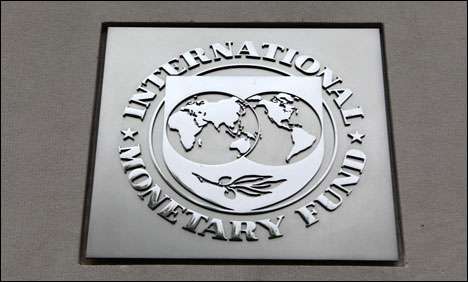 IMF sets new benchmarks for releasing next tranche
IMF sets new benchmarks for releasing next tranche
ISLAMABAD: Expressing concern over rising inflation, dependence on one-off inflows like $1.5 billion Saudi grant and a couple of other slippages, the International Monetary Fund has put in place six new structural benchmarks (including two modifications) to monitor Pakistan’s macroeconomic performance for disbursement of next tranche.
In its report on third review of the Pakistan’s performance under extended fund facility, the IMF has set four new structural benchmarks and modified two earlier benchmarks because of the government’s inability to deliver on promises.
On its part, the government committed to imposing a new surcharge on electricity consumers to recover Rs240bn term finance certificates, in addition to about Rs150bn further reduction in power sector subsidies during the current fiscal year and a four per cent increase in tariff to be approved by the regulator. It committed to set a new deadline for selling majority stakes in Pakistan International Airlines (PIA) by December this year although it missed deadlines on privatisation and restructuring of PIA and Pakistan Steel Mills (PSM) in March and then in June.
Under the new benchmarks, the government would be required to take steps to improve internal operations of the State Bank of Pakistan by re-establishing the advisory monetary policy committee to advise the SBP board on its policy decisions, establishing a committee to centralise and oversee risk management activities across the bank and beginning publishing summaries of the monetary policy proceedings of the board meetings and monetary policy committee deliberations beginning with August 2014.
Under the second benchmark, the government will be required to fill the vacancies in the National Electric Power Regulatory Authority (Nepra) board by end of this month. The third new benchmark required the government to offer minority shares in United Bank Limited and Pakistan Petroleum Limited to domestic and international investors. Fourth, the government will have to approve an administrative order to consolidate the responsibilities of public debt management in the debt management office by end September 2014.
Also read: Pakistan receives fourth IMF tranche of $556 million
Under two modifications in the missed benchmarks, the benchmark on SRO reduction will be clarified to include in the fiscal year 2014-15 budget the elimination of tax exemptions and concessions granted through SROs for an amount consistent with the fiscal deficit reduction objective.
Secondly, the date for the submission of deposit insurance legislation will be modified to allow more time for technical assistance on the draft.
The IMF also flagged a few critical risks to Pakistan economy. It warned that slippages in policy implementation could depress growth. Delays in the implementation of the reform agenda would impede investment and weaken growth prospects because of security conditions remaining challenging.
The IMF said the investment and growth continue to be hampered by terrorist threats, street violence, and urban criminal activity. The upcoming withdrawal of coalition forces from neighbouring Afghanistan may have negative spillovers on security in the border region.
It said the external vulnerabilities have subsided somewhat, but the forex reserves situation remained weak. Despite the recent improvement in gross reserves, their coverage remains low (below three months of imports). Other potential risks include: oil price volatility, which could threaten the trade balance, weakened economic conditions in GCC countries, which could have negative effects on remittances, and a weakening of the global economic recovery, which could impair exports.
The IMF said the deterioration in the overall macroeconomic environment could have a negative effect on the banking system because the balance sheets of commercial banks were highly exposed to the public sector (representing 46pc of banks’ total assets) with increase in holding of government securities, so an unlikely fiscal crisis would have a large adverse impact.
Related: IMF board approves $6.7 billion loan for Pakistan
The IMF welcomed Pakistan’s entry into international capital market after seven years but said the structure of sovereign debt issuance was similar to previous Eurobonds, with possible exposure to refinancing risks. The bullet structure of these bonds has been widely used because of their secondary market liquidity, but it increases repayment and rollover risks.
Going forward, in addition to good economic performance and a stable macroeconomic outlook, the authorities should consider a number of key factors when accessing international debt markets. It said the authorities should publicly announce intended use of the bond proceeds, especially if the purpose of the bond issuance is to fund projects, budget support, or increasing the efficiency of the local yield curve.
The IMF staff raised concerns about the recent rise in both core and headline inflation and urged the authorities to maintain a tight monetary policy aimed at anchoring inflationary expectations.
The SBP agreed to adjust the policy interest rate in a forward-looking fashion to maintain positive real interest rates in line with low inflation path, and to ensure stable and well-managed macroeconomic conditions for investors and market participants. Staff argued that additional policy actions should be considered over the coming months to maintain the agreed declining inflation path instead of just to meet programme monetary targets.
The IMF reiterated that enhanced central bank independence was key for an improved monetary policy framework. Staff provided comments on proposed amendments, noting that while the draft addresses some key weaknesses identified in the Safeguards Report, other weaknesses remain, including constraints to the SBP’s autonomy in the pursuit of its objective, and weaknesses in the SBP’s governance and internal control framework.
Staff stressed that the law should strengthen the autonomy of the SBP, through full operational independence in the pursuit of price stability as the SBP’s primary objective, enhanced governance structure, including strong internal controls, and strengthened personal autonomy of Board members and the financial autonomy of the SBP.
Among other things, the amendments should establish an independent decision-making monetary policy committee to design and implement monetary policy and prohibit any form of new direct lending from the SBP to the government










Add comment